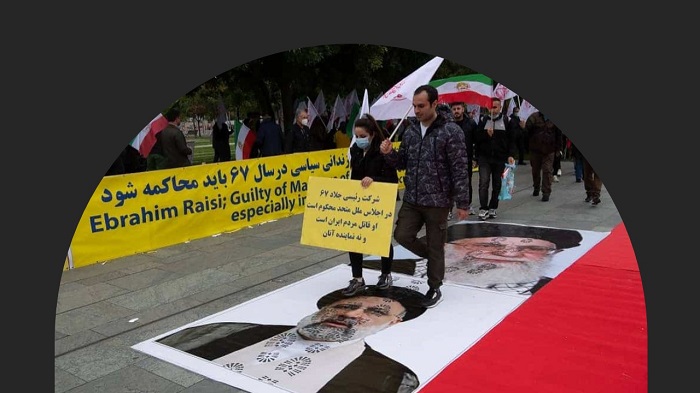
With the Iranian regime’s president Ebrahim Raisi due to attend the United Nations Climate Change Conference in Glasgow, Scotland in a few weeks, calls have once again rang out to ban his participation and hold him accountable for his role in the 1988 massacre of 30,000 political prisoners in Iran.
The National Council of Resistance of Iran (NCRI) said, “Raisi and his cabinet are “the embodiment of four decades of mullahs’ religious dictatorship and terrorism,” as the Iranian opposition leader, Mrs. Maryam Rajavi has underlined.”
Allowing Raisi to use such a platform to address the world is nothing short of a disgrace for the memory of the thousands of prisoners who were executed in the summer of 1988, and a defiance in the face of those who have called for his prosecution ever since.
Along with Raisi, a large number of the key ministers of his administration have just as appalling histories of crimes against humanity. Ahmad Vahidi, the Interior Minister, was involved in many of the regime’s high-profile terrorist acts during his tenure in the Revolutionary Guards (IRGC) Quds Force, including the 1994 bombing in Argentina which killed 85 people.
The new Foreign Minister, Hossein Amir-Abdollahian, while affiliated with the Quds Force, was involved in domestic and international attacks on dissenters.
The NCRI said, “Raisi’s choice to head the Atomic Energy Organization of Iran, Mohammad Eslami, has virtually no scientific background that would qualify him for the position. But he does boast a history of support for the regime’s proliferation activities dating back to the very founding of the Iranian nuclear program.”
Raisi’s involvement in the 1988 massacre shows just how committed he was, and still is, for violently punishing those whose views go against those of the regime. Raisi served as a key figure on the ‘death commission’ in Tehran, a panel of judges who implemented a fatwa issued by then-supreme leader Ruhollah Khomeini, which called for the deaths of supporters of the People’s Mojahedin Organization of Iran (PMOI/MEK).
The NCRI said, “Raisi has continued his human rights abuses after the 1988 massacre. At the time of the major Iran protests in 2019 Raisi was serving as head of the judiciary and thus oversaw major aspects of the regime’s response to that unrest.”
As the November 2019 uprising began, within a few days, over 1,500 people protesting were shot and killed by security forces, with thousands more injured and arrested. At the same time, Raisi was promoted from the head of the judiciary to the head of the executive branch, leaving little to no denial that things would only get worse as he assumed his new position.
Domestic attacks weren’t the only danger that people had to face as Raisi climbed to higher positions within the regime. In 2018, a failed bomb plot occurred in France during an NCRI rally, which could have been catastrophic if the plot hadn’t been thwarted. Since then, a diplomat-terrorist, and his three accomplices, have been tried and sentenced for the bomb plot and are collectively spending at least 70 years behind bars.
This, however, is one of only a few prosecutions brought against people affiliated with the regime for their crimes against humanity. Now is the time that the higher officials, and Raisi himself, need to be held accountable and face the consequences of their actions.
The NCRI said, “Those actions only reinforce the inherent threat that his regime poses to the Iranian people and global security. Rather than being dismissed in favor of the preservation of the status quo, that threat must be met head-on with sanctions, diplomatic isolation, and support for the domestic opposition movement working to free Iran from religious tyranny.”